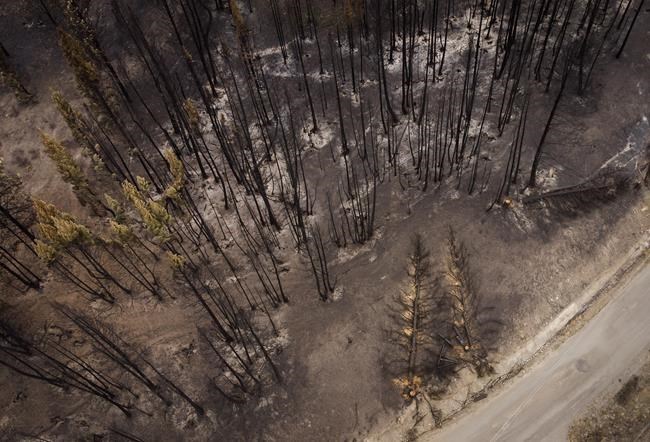LOGAN LAKE, B.C. — Lessons learned from recent destructive wildfire seasons in British Columbia will be reflected in the next budget, ensuring the province is prepared to meet similar challenges, says the premier.
John Horgan made the comments after meeting with fire officials and community members in the District of Logan Lake on Friday.
The southern Interior community was evacuated earlier this month when a wildfire singed the area. The evacuation alert for the community was lifted on Wednesday as cooler weather helped crews contain the nearby wildfire.
Horgan said he has also toured the community of Lytton and flew over Monte Lake, which were both destroyed by separate wildfires this summer.
He called the devastation "profound" and the fire season "horrific."
"We are going to spend so far, I think, it's half a billion dollars on firefighting in this calendar year and we're still in August," he said during a news conference.
"So, there's more to do and there'll be more resources spent."
The government has made changes and added resources to the budget in the past few fire seasons, he said.
But there needs to be a change in how money is earmarked for firefighting so communities can work on making homes safer all year round, not just during the fire season, Horgan said.
"We're going to bring forward a submission to government to increase the budget so that we can focus, not just on June or July, normally to September, but the 12-month-a-year approach," he said.
Historically, the budget has a notional amount of money for firefighting and the government has to rely on contingencies when that is spent, Horgan said.
"And I don't believe that we should be putting our communities at risk based on contingencies."
"If we have resources at the front end of the year, BC Wildfire Service can retain people to do the work … create guards and other scenarios around those interface communities, and that's just got to be the way we go forward."
After a hectic wildfire season, officials said the number of fires burning in the province had fallen to below 240, as cooler temperatures and rain help crews get a handle on some of the largest blazes.
The BC Wildfire Service said there have been more than 1,500 fires since the season began April 1, with more than 8,600 square kilometres of land charred.
Some Monte Lake residents who lost their homes have questioned the response to the wildfires, saying they were unhappy about the lack of protection for their properties.
Horgan said he trusts the advice of front-line workers and those who are on the ground.
"My style is to let qualified people do their work. It's been effective for me, and I believe it's been effective for the province."
The province put "every resource available" to fight the fires in Monte Lake and other communities that were burning simultaneously, he said, noting the "challenge" that climate change brings.
"We need to take steps to protect communities, protect property and protect people."
— By Hina Alam in Vancouver
This report by The Canadian Press was first published Aug. 27, 2021.
The Canadian Press



